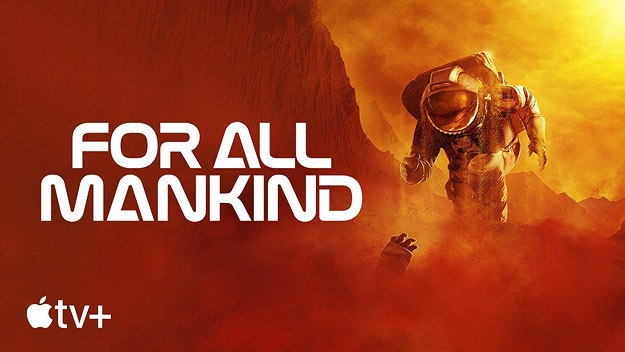But now in its third year, the show has become so much more than that. In my opinion, it’s nothing less than Ron Moore’s effort to explain how we might get from the trouble times and astronauts and cosmonauts of today to a bright, Star Trek-like future. Moore was a longtime Trek writer (on The Next Generation, Deep Space Nine, Voyager, as well as the Star Trek: Generations and Star Trek: First Contact feature films—he’s also the executive producer of the Starz’ series Outlander) and he produced the Battlestar Galactica reboot series too, so he knows a thing or two about this genre. And there are a number of former Battlestar and Star Trek writers and producers working on the show.
The first season of For All Mankind focused on the Apollo Moon missions of the late 1960s and early 1970s, while Season Two jumped a decade ahead to look at the Shuttle era and the construction of a base on the Moon in the 1980s. For Season Three, the show jumps another decade into the 1990s to tell the story of humanity’s first visit to Mars, a three-way race between the United States, the Soviet Union, and a private American aerospace corporation called Helios (obviously inspired by SpaceX).
I’ve now seen most of the season (8 of the 10 episodes) and I’m thrilled to say that the show just keeps getting better and better. Despite the time jump, the writers take care to revisit every previous character and storyline to advance them all forward. The season’s dramatic arc is surprising, emotional, and gripping. One of the criticisms of the show is that it depicts the personal lives of its characters, which leads some to claim that it’s too much of a “soap opera,” but I think that’s actually one of the show’s strengths. Rather than focusing on two-dimensional heroes or superheroes (of which there is no shortage on TV right now), the series depicts relatable, flawed, and imperfect human beings doing the hard and messy work of building a better future, and all of the many bumps and difficulties they encounter along the way. So their failures are honest and heartfelt, and more importantly their triumphs are hard earned.
Going forward, I would love to see the series take a step back from the constant “space race” plot to focus on the challenges of expanding international cooperation in space—the Americans and Russians learning to work together more, perhaps including the Chinese as well, who have thus far not factored into the series. And it seems to me that—before humanity reaches out to the gas giants—we need to see the building of the infrastructure of spaceflight; expanding the colony on Mars for example, as well as Earth and Lunar orbital infrastructure, and perhaps even the creation of an international “space academy” that the best and brightest of the whole world can join. But what’s exciting about this series is that it offers so many possibilities for the future.
Each of the previous seasons got stronger as it developed and finished on a high note, and—from what I’ve seen so far—Season Three is no exception. This is not only one of the best dramatic series on TV right now, it’s my favorite series since Battlestar Galactica, and I don’t say that lightly. The first episode of Season Three is now available on Apple TV+. If you like genre series and science fiction, and you appreciate the real achievements of human spaceflight as much as I do, trust me when I say that For All Mankind is not to be missed.
All right, we’ll leave you with a look at the cover artwork for all three of Kino Lorber Studio Classics’ forthcoming new Stanley Kubrick 4K titles, all of which are now available for pre-order on Amazon by clicking on the covers...
That’s all for now. Have a great weekend!
(You can follow Bill on social media at these links: Twitter and Facebook)










